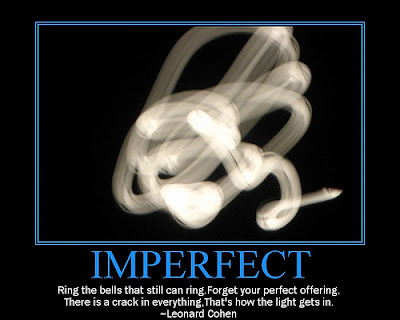
There are countless words that can be said in regards to the the theme of imperfection, countless schools of thought and different philosophies that stem from different cultures and religions; in Buddhism, imperfection is not looked upon as a bad thing, although they acknowledge perfection to exist, not in the typical human form that we do, but in the form of enlightenment and nirvana. The Greeks and Romans strived for perfection in their buildings, and oftentimes, they very nearly succeeded: the Flavian Amphitheater, usually known as the Coliseum, was inaugurated in 80 A.D and stands strong to this day.
Some people believe, without needing to belong to a certain religion, that imperfections are things that should be embraced warmly; we are all flawed, regardless of whether or not we're able to accept and admit it, and so is it not better to acknowledge and welcome the flaws than to focus on them as things we must get rid of? These people may refuse to believe in any form of perfection, other than the 'perfection of imperfection.' This is a healthy attitude, as long as it doesn't trick us into laziness and a refusal to ever change ourselves for the better: someone who is naturally rude might use this philosophy in a way that lets them believe being rude is simply a flaw they possess and one that does not need to be changed. Self-improvement is good and can be healthy, as long as the incentive behind improving yourself is a positive one.
Others may believe and recognize the existence of perfection: this can be a positive or a negative thing, depending on what kind of perfection they believe in. For example, those that are madly in love with someone could believe this person to be the definition of perfection, regardless of the small flaws they possess. In a child's eyes, their mother might be entirely perfect, although this innocent idea may disappear as they age. This form of perfection is not necessarily an unhealthy one, because it is built on love and a great deal of respect, although it can become unhealthy when you expect too much from the person you believe to be perfect. It's impractical and unfair to expect them never to make any mistakes or to never disappoint us.
Then there are those who wish to bring themselves to an everlasting state of perfection: they will always be sorely disappointed: this isn't something that's possible. What is possible, however, is succeeding, sometimes, and failing, sometimes. You must celebrate your victories and occasionally, you must also celebrate your failures, because failing and being flawed does not mean that you yourself are a failure. Often these failures and flaws become learning experiences for us, or pathways that lead us on a journey we would never have launched were it not for previous mistakes made.
I believe that imperfection does exist. It exists in the way we chew our food too loudly, in the way that we live in our beautiful homes with our warm beds and complain because we are never satisfied, while children in other countries rummage through piles of garbage to find enough food to keep them alive for another day. Imperfection exists also in the beauty of a forest floor, scattered with pine needles and dirt and it exists when someone you love dies. I think that perfection is something that also exists, but not in a solid form that can be backed up with any concrete facts.
Perfection exists in love, not because love won't have it's flaws, but because to care for someone more than you care for yourself is utter perfection. In this way, I believe that neither 'side' of my tapestry is entirely correct and that imperfection means something different to everybody. Whether or not you choose to believe in perfection can often change your outlook on the world: depending on the stance you take on perfection, this outlook can be a positive or a negative one. I'd like to end my tapestry with lyrics from a song titled Anthem, by Leonhard Cohen: I was not entirely sure where they would fit in, but I believe they are a fair representation of both sides of my theme, and also a fair representation of my ideas on imperfection: Ring the bells that still can ring/Forget your perfect offering/There is a crack in everything/That's how the light gets in.
Your reflections are highly developed and very articulate. There is an interesting array of sources here. I'd like to see a little more literature, including Shakespeare or a contemporary thrown into the mix for scope and span. The quality of your writing is very high, and I was thoroughly engaged by the depth of thinking and connection occurring here. Well done.
ReplyDelete